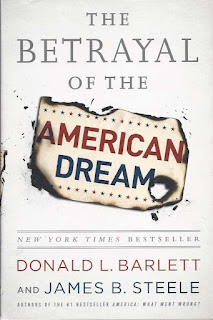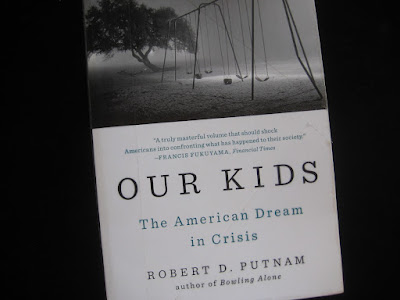I’ve always been fascinated with the concept of ‘the American Dream.’ Not
unique to America, it’s the universal idea that anyone can pull themselves up
from their proverbial bootstraps and earn success and happiness if they just
work hard enough at it. In the past, I’ve written several blogs about the
gradual demise of this ideology as a part of the American lexicon. Nowadays, it
seems to harken back to a time and period lost in the history of our country.
Two books, in particular, have done a pretty detailed analysis of the
gradual shifts in the business, political and social climates of the Seventies
that led to this major change in American society. Neither book offers up easy
answers to our current challenge of growing a stronger middle class and lifting
up others along the way.
Recently, I’ve come across two more books that tie nicely into this
question of advancement for the masses in the twenty-first century. Not
surprisingly, there’s a curious correlation between education, neighborhoods
and housing in addressing the causes of this problem.
‘Our Kids’ (The American Dream in Crisis) and ‘Golden Gates’ (The
Housing Crisis and a Reckoning for the American Dream) both address this
continuing crisis within American society.
It took a while for me to truly grasp the cusp of the problem. What I
experienced growing up back in the fifties and sixties wasn’t the same as it is
for younger folks today. Growing up, I, along with a lot of my friends, were
neither wealthy nor middle class. But that didn’t stop us from moving up in
society. We got an education, found jobs and advanced in our careers. On one
level, it seemed as simple as that.
A
friend was talking recently about being raised poor and not knowing it. His
father, along with his uncles, all worked at the Firestone Tire factory in
Akron, Ohio. It was a hard, honorable job but one that didn’t pay a lot,
especially for a household of many children and a mother who didn’t work
outside of the home. My friend’s situation was no different than the Irish,
Polish, Black and Eastern Europe neighbors in his community.
 |
| Photo by Jerry Hoffman |
My
own story of growing up poor has been chronicled in many blogs over the years.
Again, it wasn’t something my friends and I were acutely aware of aside from
the lack of a family car, no summer vacations or very few material things
around the house. Most of us started working at an early age and accepted that
as ‘par for the course.’
Starting
at age six, Sharon grew up doing chores around the farm. If the bulk tank
wasn’t cleaned twice a day, her dad couldn’t sell his milk as grade A and there
wouldn’t be a milk check at the end of the month. She remembers growing up with
no sink in the kitchen of their old farmhouse but a shiny new bulk tank instead
in the barn.
One
of the key differences for my friends and I verse our parents was education. My
Mother had a 6th grade education. My father’s educational
level is unknown. Sharon’s mother had two years of high school. Her father just
went to the eighth grade. Not unusual for that generation.
Yet because of our own opportunities at education, our kids, Brian and
Melanie, have between them a law degree and a masters in entrepreneurship. Our
grandchildren have a legacy in education that will demand, even now, that they
will probably have advanced degrees beyond just college.
As mentioned in ‘Golden Gates’: “It was hard to see it back then, but
America was in the middle of a vast realignment that was fundamentally altering
where we live, how we work, and the structure of our families. Ultimately,
growing class segregation across neighborhoods and schools means that rich
Americans and poor Americans are living, learning, and raising children in
increasingly separate and unequal worlds, removing the stepping-stones to
upward mobility.”
It wasn’t always so cloudy in this country in terms of potential
financial advancements for the average person. After World War Two, there was
unprecedented growth with the GDP. That growth in the middle class slowed and
gradually lost its luster beginning in the late 60s and early 70s.
The 1970s were also notable for another reason. It harkened in the
beginning of a new financial equation. It was the beginning of a new mindset
about real estate, when property in every shape, location, and purpose became a
good financial investment.
The
intertwinement and entanglements of business and political interests has been
going on for a long time now. It’s no secret that lobbyists weld an enormous
power in Washington for the vested good of special interests and the moneyed
elite. Generally speaking, it’s the middle class who gets the short end of the
dollar stick in most of these transactions, arrangements and agreements made
into law.
A
Harvard professor has been quoted as saying: “There will be a time very shortly
when young people-very young people- will be looking into computer screens.
They will be looking directly into screens, not to the side, so there will be
no peripheral vision; they won’t be looking over the top, so they won’t see
what’s ahead; they’ll be staring straight ahead into those screens, blind to
everything ahead and around them.”
Money
managers and financial product traders will be selling, buying, and swapping
financial products around the world. With that narrow focus, like a horse with
blinders, they will have more control and hold more power in those split
seconds than we can today imagine. And all of it entirely focused on short-term
gains.”
The
financial crisis of 2007-2008 revealed the fallacy of this short-term thinking.
We used to have an economy that manufactured stuff, now it manufactures debt.
This concept of ‘wealth supremacy’ suggests that the core aim of our economy
should be delivering ever-increasing gains to investment portfolios instead of
a wider distribution of wealth to the masses. While there is no easy answer,
education, once again, comes into play here.
Financial
literacy is a topic of interest that every American should acquaint themselves
with. Essentially, it is the ability to use one’s knowledge and skills
to effectively manage financial resources, ideally for a lifetime of financial
well-being. Indeed, financial literacy is something we all have to work on each
day—it’s part of our ongoing education.
Despite being a relatively new field of study, financial literacy has
become increasingly important for governments and citizens – without it there
can be broad implications for the economic health and stability of countries.
While we can’t, as individuals, control the stock market, affect
financial futures or the political games being played in Washington, we can
steel ourselves against the mis-information and financial pitfalls all around
us. It is up to each one of us to watch our pocketbooks and nest egg for the
future. No one else will do it for us.













No comments:
Post a Comment